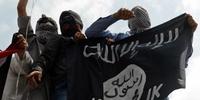-
French jets attack ISIS targets in Iraq
French military jets earlier this morning (Friday) have carried out the first strikes by a U.S. ally against Islamic State (IS) militants in Iraq. A statement from the office of President Francois Hollande said the planes had attacked an ISIS depot in north-east Iraq, and that the coming days will see additional French attacks on the Islamist group. The United States has carried out more than 170 air strikes against the Jihadist group in Iraq since 8 August. President Francois Hollande’s office said Rafale planes had carried out the attack and “the objective was hit and completely destroyed.” The statement added that “Other operations will follow in the coming days.”
-
-
U.S. intelligence, leaders unclear on exact danger posed by ISIS

Considerable discrepancies in the reporting from U.S. intelligence services regarding the strength of the Islamic State (IS) have led critics to the conclusion that the U.S. intelligence community knows little about the terrorists’ actual strength as the United States is in the process of developing a military strategy to defeat the Islamist organization.
-
-
Two ISIS supporters arrested in Australia for planning a public beheading in Sydney
Yesterday (Thursday), the Australian security services, conducting the largest counterterrorism raids in the Australia’s history, arrested fifteen ISIS supporters, charging two of them with planning to grab an Australian citizen and publicly behead him on a Sydney street – while filming the operation for posting on social media. The government says about 100 Australians are actively engaged in activities within Australia aiming to support extremist Islamist groups — recruiting fighters, grooming suicide bomber candidates, and providing funds and equipment.
-
-
Terrorists can be defeated by fighting fear with cooperation
From anarchists in the 1920s and radical leftists in the 1960s, to fringe, extreme-right Christian bombers or gunmen in the United States in recent decades, or radical Islamists such as Islamic State today, terrorist groups have one thing in common. They seek to shock, while simultaneously portraying themselves as victims. While their beliefs can vary wildly, what they all share is the “propaganda of the deed” in their extreme violent activities. Given that we have seen a number of terrorist groups come and go over the decades, it bears scrutiny how these various groups were successfully stopped, as well as where governments failed. At present, radical Islamic terrorists do not appear to have the capacity to develop well-organized cells in places like Australia or Canada, and will most likely dissipate as previous anarchists and ultra-Marxists did decades ago. The next big question in all of this is how to de-radicalize. What has worked and what has failed in terms of de-radicalization efforts by various governments? Hopefully, the government is engaged in a careful consideration of this, and has thought about how other countries have handled the problem of domestic terrorism.
-
-
U.S. launches campaign to combat recruitment of young Americans by militant groups

The White House, Justice Department (DOJ), DHS, and the National Counterterrorism Center have formed an alliance to combat the recruitment of young Americans to join militant groups like the Islamic State (IS) and Somali-based al-Shabaab.Officials have not released details on the network of community partnerships but local law enforcement officials, religious leaders, teachers, mental health professionals, and parents are expected to help monitor at-risk youths.
-
-
NYC mayor de Blasio facing criticism for curbing counterterrorism programs
New York City mayor Bill de Blasio is facing backlash over his decision to curb several counterterrorism programs introduced by former mayor Michael Bloomberg. Among other things, de Blasio has restricted the NYPD’s stop-and-frisk program; approved issuing municipal IDs of standards lower than those mandated by the federal government’s RealID program; is refusing to reinstate a special surveillance program which targeted Muslim communities in New York; and has also replaced the highly regarded deputy police commissioner for intelligence.
-
-
Sensors everywhere might mean privacy nowhere: Expert
Just as we are coming to grips with having less privacy in our lives thanks to the Internet, a new use of the technology is poised to present new questions about security and privacy — and create a new threat to society. The so-called “Internet of Things” will see small microprocessors and sensors placed seemingly everywhere, and these devices will collect much data about us — often without our knowledge. A second concern with the Internet of Everything is that we may have already crossed a threshold where a large event that would cripple these devices would mean that our current civilization would come to an immediate stop. An occurrence of a massive solar flare, like the 1859 Carrington Event, could disable all the devices on which we have come to depend. “If something like that were to happen, the Amish would become the only people without a major life upheaval,” says one researcher.
-
-
The latest trend in Jihadist recruitment in the West: Women

Counterterrorism officials have been dealing with the threat of Westerners traveling to the Middle East to join the Islamic State (IS), but now they must also combat the growing threat of American female Jihadists joining IS and other militant groups, including Somali-based, al-Shabaab. Photos and videos of female Jihadists on Islamic social networks show them enforcing Islamic dress codes on local women in captured villages, and even cooking for their male counterparts.
-
-
The State of New York launches disaster preparedness initiatives
The state of New York is implementing a proactive strategy to deal with the threat of terrorism and natural disasters like Superstorm Sandy. Local municipalities have been granted state support for emergency preparedness projects, and the state’s Division of Homeland Security and Emergency Services(DHSES), led by commissioner Jerome Hauer, has expanded its regional footprint from five planning/response regions to ten. “Mother Nature has become much more aggressive, so we too must adopt a similar posture to ensure we are ready to respond effectively when the next disaster strikes, Hauer says.
-
-
R&D at DHS is “inherently fragmented”: GAO
The GAO says that DHS does not know how much it spends on R&D, making it difficult for the sprawling agency to oversee and coordinate those efforts. David Maurer, GAO’s director of Homeland Security and Justice, told a House hearing that R&D at DHS is “inherently fragmented.” The reason is that each of several components of the agency — the Science and Technology Directorate, the Coast Guard, and the Domestic Nuclear Detection Office — are given R&D responsibilities by law. At the same time, other DHS components conduct their own R&D efforts as long as those activities are coordinated through the S&T office, Maurer said.
-
-
U.S. tightens scrutiny of U.S.-bound airline passengers

Roughly 1,000 of the 4,000 fighters who traveled to Syria and Iraq to join ISIS carry passports of one of the thirty-eight Visa Waiver Program countries – countries whose citizens do not need a visa to enter the United States. U.S. officials are now reviewing methods used to screen airline passengers with passports from Visa Waiver countries before they board U.S.-bound flights.
-
-
Lawmaker says more needs to be done to counter domestic radicalization
House Homeland Security Committeechairman Mike McCaul (R-Texas) says the Obama strategy to defeat ISIS fails to discuss plans for battling home-grown terrorists. McCaul wants the White House to appoint a lead agency to oversee the government’s counter-radicalization programs, adding that the Obama administration has no clear way of measuring the impact of its current initiatives to counter terrorist recruitment efforts.
-
-
ME Sunni states join anti-ISIS coalition
The U.S. strategy to confront and defeat the Islamic State (ISIS) received a major boost yesterday when Middle Eastern governments formally agreed to join the war coalition against the Islamist group. The details are yet to be worked out — for example, what country will make what contribution, how to conduct the war against ISIS inside Syria in a way which will strengthen the moderate opposition rather than the Assad regime — but the fact that Sunni countries in the region have agreed openly to side with the United States against fellow coreligionist is important. The Obama strategy would have to be calibrated carefully. A major element of Obama’s strategy is the strengthening of the moderate Syrian anti-Assad rebels so they can become a more effective force against ISIS. The moderate rebels’ greater military capabilities may well, at some point, be turned again against the Assad regime, and regional supporters of the moderate rebels such as Saudi Arabia would want the now-strengthened rebels to finish the job of removing Assad from power. The administration has studiously avoided becoming involved in the Syrian civil war, but the campaign against ISIS inside Syria may see the United States getting sucked into that conflict.
-
-
Political traffic by Arabs on social media overwhelmingly hostile to, suspicious of U.S.
Researchers found that a great deal of the political and social traffic by Arabs on social media is deeply hostile to and suspicious of the United States. U.S. officials are concerned that Internet users in the Arab world understand history and current events in ways fundamentally different from the American version. “Suspicion and opposition to U.S. foreign policy appear to be so deep and so widely shared, even by those on opposite sides of other contentious issues, that it’s hard to imagine how the U.S. could begin to rebuild trust,” said one expert.
-
-
Obama’s new strategy still misses Islamic State’s weakest link
President Barack Obama was right to say in his speech on Wednesday that “ISIL is certainly not a state.” While IS does not have standing as a state among the community of nations, its strategy is focused on establishing an Islamic State. That’s why any response by the United States should be focused on preventing it from doing so. Unlike terrorist groups that seek to disrupt society, IS is focused on the establishment of a new society. Doing so requires IS to build the three pillars critical to a functioning state: Creating legitimacy; providing public security; and catering to the basic needs of the population, such as water, food, health, and shelter. Seeing Islamic State as an overextended rogue state, rather than a terrorist network, and working to weaken the civil pillars of the state it is trying to establish, offers the best chance of stopping IS.
-
More headlines
The long view
What Does Netflix’s Drama “Adolescence” Tell Us About Incels and the Manosphere?
By Lewys Brace
While Netflix’s psychological crime drama ‘Adolescence’ is a work of fiction, its themes offer insight into the very real and troubling rise of the incel and manosphere culture online.
A Shining Star in a Contentious Legacy: Could Marty Makary Be the Saving Grace of a Divisive Presidency?
While much of the Trump administration has sparked controversy, the FDA’s consumer-first reforms may be remembered as its brightest legacy. From AI-driven drug reviews to bans on artificial dyes, the FDA’s agenda resonates with the public in ways few Trump-era policies have.
The Center Can Hold — States’ Rights and Local Privilege in a Climate of Federal Overreach
As American institutions weather the storms of executive disruption, legal ambiguity, and polarized governance, we must reexamine what it means for “the center” to hold.
How to Reverse Nation’s Declining Birth Rate
By Alvin Powell
Health experts urge policies that buoy families: lower living costs, affordable childcare, help for older parents who want more kids
Foundation for U.S. Breakthroughs Feels Shakier to Researchers
By Max Larkin
With each dollar of its grants, the National Institutes of Health —the world’s largest funder of biomedical research —generates, on average, $2.56 worth of economic activity across all 50 states. NIH grants also support more than 400,000 U.S. jobs, and have been a central force in establishing the country’s dominance in medical research. Waves of funding cuts and grant terminations under the second Trump administration are a threat to the U.S. status as driver of scientific progress, and to the nation’s economy.
The True Cost of Abandoning Science
By Steven R. Furlanetto
“We now face a choice: to remain at the vanguard of scientific inquiry through sound investment, or to cede our leadership and watch others answer the big questions that have confounded humanity for millennia —and reap the rewards.”
